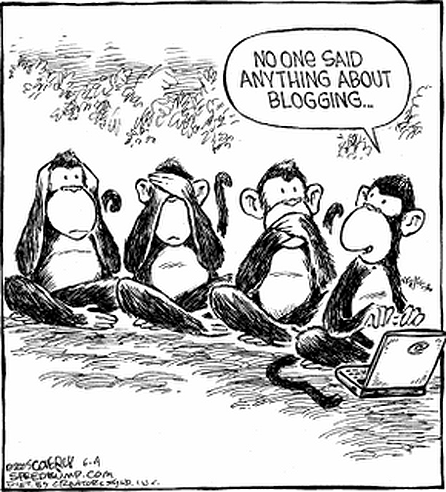Sticks and Stones: My Incendiary Blog Post on Catholic Civil Discourse
 In an Internet culture filled with prejudice, innuendo, and anonymous attack, Catholic blogs should distinguish themselves by their truth, reason, and civility.Last year, natural historian Chris Clarke published "How to Write an Incendiary Blog Post" on his blog, Coyote Crossing. It was a parody about what a truly incendiary blog post would look like. Here's his opening sentence:
In an Internet culture filled with prejudice, innuendo, and anonymous attack, Catholic blogs should distinguish themselves by their truth, reason, and civility.Last year, natural historian Chris Clarke published "How to Write an Incendiary Blog Post" on his blog, Coyote Crossing. It was a parody about what a truly incendiary blog post would look like. Here's his opening sentence:
"This sentence contains a provocative statement that attracts the readers' attention, but really has very little to do with the topic of the blog post."
I haven't been writing long enough to try a stunt like that, so before you read on, this really is an incendiary blog post about incendiary comments on Catholic blogs. I really do mean to get you all fired up about being a little less fired up! Then Chris Clarke went on to describe the components of his model incendiary blog post. A subsequent sentence clarified what was in store for his readers:
"This sentence expresses the unwillingness of the writer to be silenced despite going against the popular wisdom!'
Okay, I'm going to own that one. I have to write about this despite the potential for opening myself up to the same sort of rhetoric that has been aimed at some high profile priests online lately. And I don't just mean Fr. Tom Euteneuer and other priests accused or suspected of personal failures that spillover into public view. A number of priests who are high profile in the public square are also dragged through the public mud. And not just them, either. Some of the cyber-ridicule is also aimed at well-meaning Catholics who attempt to write coherently, responsibly, with sound reason and charitable restraint about the people and topics sizzling on Catholic blogs these days.

There’s something about the online world that causes some people to respond in reactionary fury in their futile quest to bring others around to their own point of view. You won't have to look very far for some glaring examples among the comments on some purportedly Catholic blogs and websites.I have something to say about this as an outsider looking in. And believe me about the "outsider" part. As an accused and imprisoned priest - though I will say "falsely accused and wrongly imprisoned" until the day I die - I am the ultimate outsider in the Church and priesthood. In the Solar System of Church life, I now write from the Oort Cloud.So in a way, I'm a good candidate to take a stand for civility in the face of offensive rhetoric. There simply isn't anything anyone can do to me or take from me. No one can possibly speak more ill of me than has already been spoken. The finger of accusation cannot make any further dent in my armor. No amount of ranting and raving in my direction can bring me any further down. And, most fearful of all for priests accused in the current climate, I cannot be thrown into prison. I'm already there, and I've been there for so long that all the things I once strove to have and to be - all the ambition I once had as a priest to be thought of well in the eyes of this world - are but shattered hopes and dreams.So what's left? Truth and justice, and the Beatitudes themselves, and I cling to them with such tenacity that I consider little else of value these days. If we as a Church abdicate those values, we doom the Body of Christ."SEEK JUSTICE UPON THE HIGH ROAD"Discourse that calls itself Catholic should be distinguished by its civility. Have you noticed that These Stone Walls has a new "Comments Policy"? It wasn't prompted by anything that happened on TSW. The fact is that in our 18 months of existence, I can still count on one hand the number of comments we have rejected because they were filled with hateful rhetoric, unfounded innuendo, or sheer exasperation that an accused priest would dare defend his name and his Church in public.There have been so few such comments directed to These Stone Walls that I began to wonder if anyone was actually reading some of my more incendiary posts like "When Priests Are Falsely Accused" or "The Exile of Father Dominic Menna." It turns out that people are not only reading those posts, but also re-publishing them on other blogs and websites. It was on some of those that the attacks came. One of the founders of S.N.A.P., no surprise, declared me "a dangerous and demented man" in a comment on one site. It was just empty name-calling, but then a few others chimed in. His comment wasn't based on anything he thought I did or was accused of doing. It was posted at an article I wrote about fairness and due process for accused priests, something to which he is apparently opposed.Such voices are few, but they are loud and one-sided as the voices of bullies are known to be. I have a lot of experience with bullies. Prison is filled with them, and cowering from their hateful rhetoric is never an option. I've simply learned to see them for what they are.

I found the S.N.A.P. comment to be hauntingly familiar, and couldn't really be offended by it. In one of my more incendiary posts - "Saints Alive!" - I described how one Church treatment professional called Padre Pio, sight unseen, "an ignorant, self-mutilating psychopath" when he tried to defend himself against repeated, but untrue, accusations of sexual misconduct.How could I take offense at being labeled by fellow Catholics in terms so stinging, but so familiar? The tragic irony of the Padre Pio story is that if he was accused today, in America, his agenda-driven discreditors would declare open season on him in the online world, and the sensus fidelium - the public acclamation that Padre Pio was a living saint - would be drowned out in a sea of rhetoric by the loud noises of a mob. And that is exactly what drives witch hunts.
They are always fueled by two factors: the noise of a few and the silence of many.
FREE SPEECH?Disparaging comments are certainly not a problem exclusive to Catholic blogs and websites. The Internet is saturated with toxic rhetoric. In a recent USA Today column by Ken Paulson, President of the First Amendment Center, ("Online ugly - yet free speech," Feb. 22, 2011), he wrote about proposed legislation to prevent disparaging the dead on memorial sites like www.legacy.com. It's a gross abuse of the First Amendment to argue that a comment suggesting that a fourteen-year-old accident victim "didn't suffer enough" is free speech protected by the First Amendment. The problem, as Ken Paulson described it, is that website managers, and not the government, should monitor and prevent disparaging rhetoric from being posted online.Ken Paulson proposed several remedies for sites concerned about the growing presence of offensive comments. His suggestions included banning comments altogether, posting clear standards under which comments will be welcomed, and strict moderation of comments. That's why These Stone Walls has a Comments Policy. Only one or two people in 18 months have sent disparaging comments, and then criticized These Stone Walls for not posting them, as though there is some sort of right to be heard.The rhetoric we refused to post wasn't even about me. It was more along the lines of the typical sound bites we read when secular venues post every comment they receive in order to boost the appearance that they are widely read. They were anti-Catholic statements, usually typed in all caps, such as "THE VATICAN IS MORALLY BANKRUPT,” THE POPE IS A CRIMINAL,” “THE CHURCH PROTECTS PEDOPHILES and so on. We won't post such bigotry. In Ken Paulson's USA Today column cited above, he stressed that the First Amendment also gives blogs and websites the right to determine their own content:
"Abusive commenters have the right to free speech, but that doesn't mean that websites have to give them a soapbox."
We also won't post anonymous comments. Ken Paulson cited one secular newspaper's complaint that forcing readers to register, and to identify themselves honestly, decreases the size of the on-line audience. I find that difficult to believe. What it does decrease is the number of comments, not the number of people reading the content. Judging the success or importance of content solely by the number of comments it receives is shallow, at best, and demeans the importance of the commenters' own content. An example is my recent post, "Cable News or Cable Nuisance." It received (to date) only a few comments. But have a look at those comments, please. Some of them are actually better than the post itself, and they are comments I am proud to have on These Stone Walls.In fact, I am in awe of most readers' comments on TSW. Most are written in the finest Catholic tradition of thought-provoking reason, charity, and civility. I would much rather have a few comments like those than the long list of angry, nasty remarks you might see after most secular online material about Catholic issues or the Catholic Church.OPEN FORUM AT THE EXPENSE OF CIVIL DISCOURSEThere is nothing in our experience that so easily entices people from the straight road of Christian civility, due process of law, and civil discourse more than the ability to write whatever we want with no conscious sense of personal responsibility, or, far worse for the soul of any Catholic, with an air of moral superiority.In the online world, we can be anyone or no one at all. We can light fires with our words, or we can fan an inferno lit by someone else. We are free to write with the assurance that no one out there knows who we are, or can suspect what is truly in our hearts. We can strip the Beatitudes from our soulful existence, and let anger and disdain run amok. We can take a rumor and run with it without ever stepping for a single moment into the shoes of the subjects of our contempt. We can delude ourselves into kneeling before God with thanks that we are truly unlike that tax collector over there on the other side of the Church. We can pat ourselves on the back believing that his sin, now in the open, is so much worse than our own, still hidden behind the veil of cyberspace - hidden from everyone but God.

Every now and then TSW readers send me snail mail with articles printed online from Catholic magazines and websites, and often they include some of the comments. When anything arrives from the National Catholic Reporter, I find myself tossing the comments away unread. Too many are just too toxic, and leave me wondering why NCR posts them. I can come up with no other reason than a belief that the sheer number of comments is interpreted by NCR as a measure of the article's - or newspaper's - influence. It’s a sad commentary on the much- diminished NCR’s future as a Catholic voice, once mainstream, but now increasingly seen as dissenting, divisive, and fringe.Recently, I was sent an excellent two-part article entitled "Priests in Limbo" by Joan Frawley Desmond that appeared at the other (and, in my opinion, far superior) "NCR," the National Catholic Register. Some of the comments were included, and I was struck by the depth of thought behind most and the civility Of their discourse. But then one commenter disparaged the Catholic Church as "morally bankrupt" and declared the priesthood corrupt. The anti-Catholic rhetoric was so out of place that it left me wondering why the Register posted it. It did not reflect an alternate point of view. It reflected only ignorance and bigotry and had no place on an otherwise respected Catholic site.The real target of such comments is clear, and Catholic bloggers must not be the unwitting mouthpiece of such agendas in the name of fairness, free speech, or the First Amendment. As Ken Paulson pointed out above, you have the right, under the very same First Amendment, to determine the content of what is out there on-line in your name on your website. I would go a step further. For Catholic blogs and websites, that right becomes a responsibility.On February 14th last month, the Catholic Exchange published "A Voice in the Wilderness” by writer and TSW contributor, Ryan A. MacDonald. It wasn't about me. It was about TSW, and there is one line that filled me with pride at what this blog has become. Ryan wrote.
"These Stone Walls portrays articulately a spirituality for the wrongly imprisoned, and it does so with grace, dignity, and a challenge to all of us to seek justice upon the high road."
If I die in prison, I would like that to be the last word. It makes writing from the Catholic Oort Cloud feel a lot less like an exile and more like a challenge. I must never use my Catholic blog to further some agenda that comes not from my soul, but solely from the craters of a broken heart. I am an angry man, and I believe I have every reason to be. But These Stone Walls cannot be both an angry blog and a Catholic blog. I opt for the latter.
“I don’t think there is anyone who needs God’s help and grace as much as I do . . . We cannot find God in noise or agitation. What is essential is not what we say, but what God tells others through us.” Mother Teresa, The Power of Prayer (New York, MJF Books, 1998, pp. 7-8).

![]()
